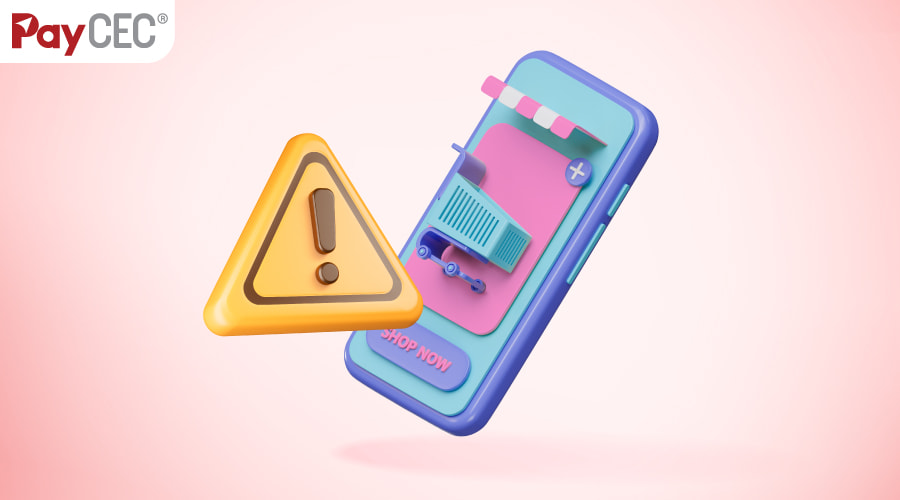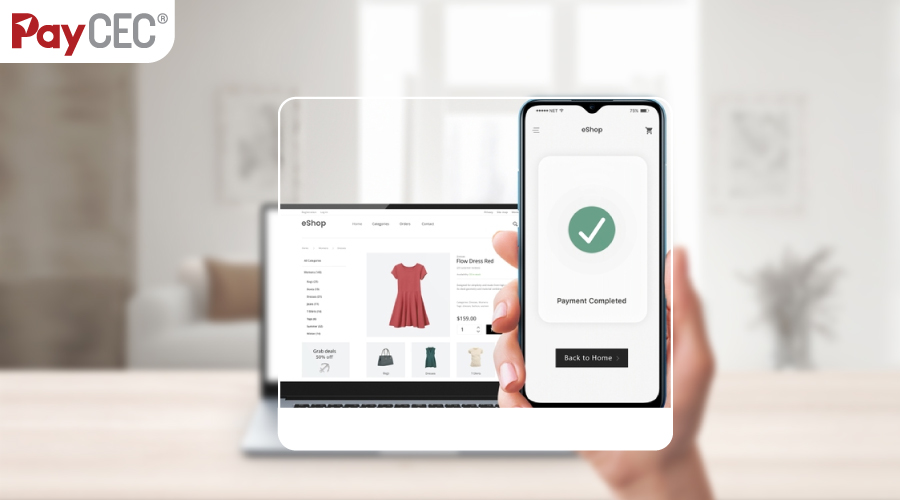- Hotline +65 6631 8332
Payment Gateway Licenses You Should Know To Protect Your Online Business
Wednesday, 06 Dec, 2023

This article is a part of PayCEC payment insights
Follow PayCEC - global payment gateway to get updates on the latest payment trends and ecommerce news
What's inside?
A high-security payment gateway enables businesses to reach out to a huge group of customers while ensuring risk-free and instant transactions across the globe. Besides security, speed, and convenience, users must also choose payment gateway providers that are verified with international licenses, for they ensure the highest level of protection for their online transactions.
Licenses in Online Payment: What They Are For and Why Having Them is A Must
Financial-related procedures have to follow internationally approved standards to ensure consistency and transparency in trading, avoiding any fraud, cyber risk, unexplained loss and damage, etc. Especially in digital payment, where things get even more complicated for authorizing identity and access from real people, strict terms and policies regarding this matter must protect both online sellers and buyers.

Payment gateway licenses are regulatory approvals and authorizations in the financial services and online payment industry.
Payment gateway licenses are regulatory approvals and authorizations that businesses must obtain to operate in the financial services and online payment industry legally. Typically, an online payment process includes several steps relating to many parties. Because each step hides a different risk of unauthorized access, they must adhere to globally approved standards, such as licenses for data protection, customer protection, service providers, market access, legal compliance, operational stability, cross-border operation, etc.
Five Payment Gateway Licenses You Should Know For Your Healthy E-commerce Business
The below list will show you five of the most popular payment gateway licenses in the market, which are essential for any payment gateway service provider to go above and beyond.
1. Payment Card Industry Data Security Standard (PCI DSS) Compliance
PCI DSS Compliance It is a set of security standards designed to ensure that all companies that accept, process, store, or transmit credit card information maintain a secure environment. PCI DSS compliance aims to protect sensitive cardholder data from theft and secure payment card systems. The 12 requirements of a PCI DSS payment gateway license are:
- Install and maintain a firewall configuration to protect cardholder data.
- Do not use vendor-supplied defaults for system passwords and other security parameters.
- Protect stored cardholder data.
- Encrypt transmission of cardholder data across open, public networks.
- Use and regularly update anti-virus software or programs.
- Develop and maintain secure systems and applications.
- Restrict access to cardholder data by business.
- Assign a unique ID to each person with computer access.
- Restrict physical access to cardholder data.
- Track and monitor all access to network resources and cardholder data.
- Regularly test security systems and processes.
- Maintain a policy that addresses information security for all personnel.
Adherence to standards like PCI DSS reflects a commitment to high security, fostering trust. In a dynamic regulatory landscape, possessing these licenses is not only about current compliance but signals adaptability, positioning businesses for sustained success in online payments. Indeed, having these licenses is a strategic imperative for trust, security, and long-term viability.

PCI DSS compliance aims to protect sensitive cardholder data from theft and secure payment card systems.
2. EMVCo Licenses
EMVCo (Europay Mastercard Visa – EMVCo LLC) is a global consortium that manages and develops specifications for chip-based payment cards and terminals. It is a payment standard management consortium with control divided equally among Visa, MasterCard, JCB, American Express, China UnionPay, and Discover. EMVCo has four certificates including EMVCo Level 1 Approval, EMVCo Level 2 Approval, Contactless Communication Type Approval, and Terminal Integration Process (TIP). These certifications are essential for ensuring the security and interoperability of chip-based payment systems.
Products and solutions adhering to EMVCo standards may undergo evaluation and certification by approved laboratories to ensure compliance with security and functionality requirements.
3. SecureTrust by Trusted Commerce
SecureTrust by Trusted Commerce offers a suite of security and compliance services for businesses. This includes SSL certificates for secure online communication, PCI compliance services for handling credit card transactions, regular security scanning to identify vulnerabilities, trust seals to display on websites, and privacy solutions to address data protection regulations.

Cybersecurity is critically important, for it protects the sensitive financial information of individuals and businesses engaged in online transactions.
4. Tokenization
Tokenization is a cybersecurity process where sensitive data, such as credit card numbers, and passwords are replaced with unique tokens, adding a layer of security. Tokenized data is stored and transmitted instead of actual data, reducing the risk of exposure in case of a breach. These tokens, meaningless strings of characters, have no direct link to the original data, therefore effectively stopping any unauthorized access from tracing back to users’ confidential data.
5. 3D SECURE
3D Secure, or "Three Domains", is the new security feature that financial institutions and payment providers add to their payment process to enhance security for their customers and partners. As it is called, the system includes three parties in the transaction:
- The issuer domain: The bank or financial institution that issues the card.
- The acquirer domain: The merchant's bank or financial institution.
- The interoperability domain: The infrastructure the card scheme provides, such as Visa or Mastercard.
The 3D Secure payment gateway will ask payers to authenticate their identity in the purchasing process with a one-time passcode that is sent to their registered phone numbers. This helps protect against unauthorized use of your card for online transactions, as it adds a step beyond just entering your card details.

A one-time passcode protects against unauthorized use of users’ cards for online transactions by adding a step beyond just entering their card details.
The 3D Secure feature is now launched and integrated into most payment gateway providers with different names, such as Visa Secure By VISA, Mastercard’s ID Check, Mastercard’s ID Check, American Express’s Safekey, J/Secure By JCB, Protectbuy By DISCOVER, ProtectBuy by Diners Club , and more.
Another option to ensure secure, quick, and easy-to-install online transactions is to use a banking payment gateway . It is a checkout system hosted, maintained, and controlled by the merchant’s bank that has its own benefits and drawbacks. However, this method often offers less customizable features and only allows transactions within the bank itself.
6. Conclusion
Since online transactions, involving multiple steps and parties, present diverse risks of unauthorized access at each stage, businesses in the financial service sector are required to comply with internationally recognized standards. However, these standards encompass so many aspects that archiving and maintaining them throughout the operation time is bound to be a challenging matter. That’s why most businesses have decided to cooperate with prestigious payment gateway providers who are experts in their field, as well as have their products and services certified with those licenses, to help simplify and safeguard their payment services. And that is the main reason certified payment gateway providers like PayCEC have been trusted for so long.

Payment gateway licenses are vital safeguards ensuring compliance, consumer protection, and the prevention of financial crimes in cyberspace.
With PayCEC , Your Online Transactions Are at The Highest Level Of Security
Like any other payment gateway service provider, PayCEC protects its buyer and seller partners by making an effort and dedication to its services and adhering to international standards with required payment gateway licenses.
With all of the payment gateway licenses above, PayCEC also has its Terms and Policies that would make digital transactions easier, faster, and more convenient to its partners, including 24-hour Fast Integration, 24/7 Premium Customer Support, API-First Development, etc., The company also offers its high-end services to thousands of businesses and corporations across the globe, becoming a leading payment gateway solution in the market.
In conclusion, payment gateway licenses in e-commerce are not just legal requirements; they are vital safeguards ensuring compliance, consumer protection, and the prevention of financial crimes in cyberspace. Obtaining these licenses is a must for operational stability, market credibility, and global expansion.
About PayCEC
PayCEC was established in response to the growing need for businesses to accept online payments more quickly and easily. In the new media era, our payment flow has evolved to work seamlessly and effectively across all platforms and devices. We pride ourselves on combining superior technology with first-class customer service.
PayCEC is a truly global payments platform that not only allows customers to get paid but also withdraws funds to their business accounts in various currencies.
We have created an open and secure payments ecosystem that people and businesses choose to securely transact with each other online and on mobile devices.
PayCEC Team
Frequently Asked Questions
Are payment gateways regulated?
A payment gateway agreement is a legal contract between a business and a payment gateway provider, establishing a term for using the payment gateway services.
Key components include a description of the services, delineation of fees and charges, agreement duration, termination conditions, and provision for security and compliance. The agreement addresses data handling and privacy, outlining how customer information is safeguarded.
Liability and indemnification clauses define responsibilities in case of breaches or disputes. Service Level Agreements (SLAs) set performance expectations, and technical requirements specify integration details. Dispute resolution procedures and the identification of governing law are also included. Before entering into such an agreement, careful review by both parties, often with legal counsel, is crucial to ensure alignment with business needs and legal protection.
What is the payment gateway agreement?
A payment gateway agreement is a contractual arrangement between a merchant (seller) and a payment gateway provider. This agreement outlines the terms and conditions governing the use of the payment gateway services for processing online transactions. It serves as a legal framework that defines the rights, responsibilities, and obligations of both parties involved in the payment processing relationship.
A payment gateway agreement encompasses key elements such as service descriptions detailing transaction processing and security features, transparency on fees and charges, payment terms including billing cycles, adherence to security standards like PCI DSS for customer data protection, guidelines for data handling and privacy, specifications for technical integration into the merchant's platform, agreement duration and termination conditions, allocation of responsibilities in case of disputes, procedures for dispute resolution, potential Service Level Agreements (SLAs) outlining performance expectations, and protocols for communication regarding updates or changes to the payment gateway services.
Thoroughly reviewing these components is essential for merchants to ensure clarity, compliance, and a comprehensive understanding of the operational and financial aspects of utilizing payment gateway services.
It's crucial for merchants to thoroughly review and understand the terms of the payment gateway agreement before entering into the partnership. This helps ensure transparency, compliance, and a clear understanding of the financial and operational aspects of using the payment gateway services.
News
Business
Products

who we are
about us
We are honored to serve as your reliable business partner and financial service provider in the industry and other business-related services. With the help of our professional staff, to help merchants to achieve their goals for the development and expansion of the international business market.
Our payment flow has developed in the e-commerce world to perform seamlessly and effectively across all platforms and devices. We take pleasure in combining technology with customer service, to solve your concerns at the moment.
PayCEC is a fully worldwide payment network that not only allows merchants to be paid immediately and securely, but also allows them to withdraw money in multiple currencies to their company accounts.



































 +65 6631 8332
+65 6631 8332






 Processing
Processing